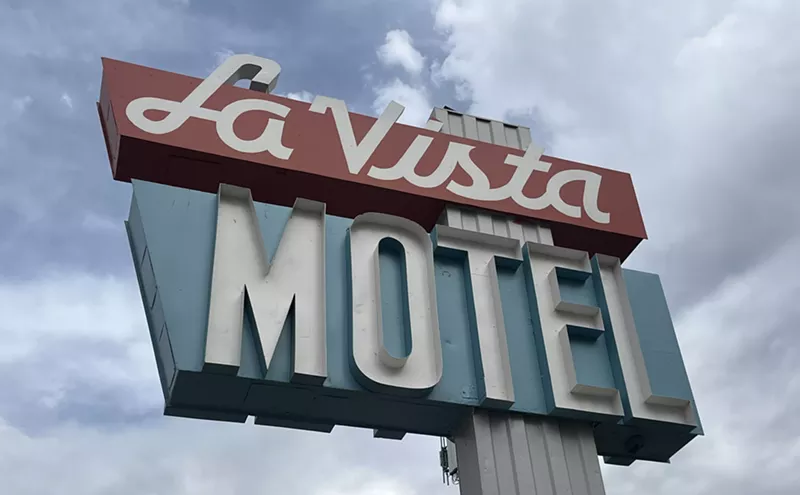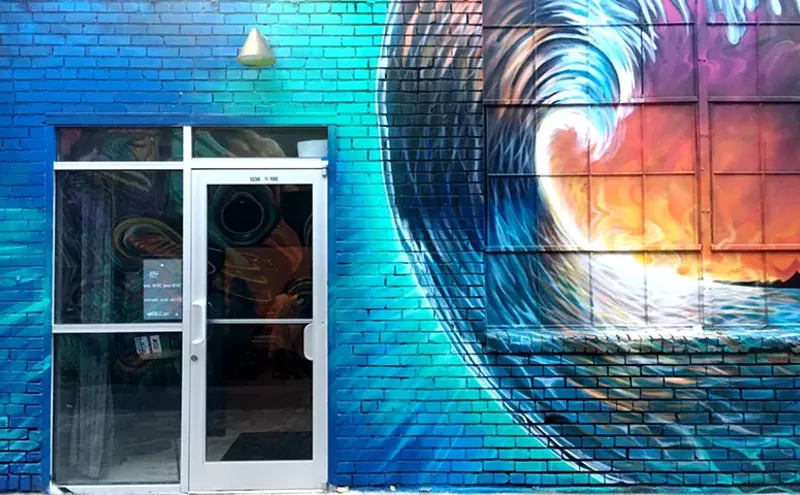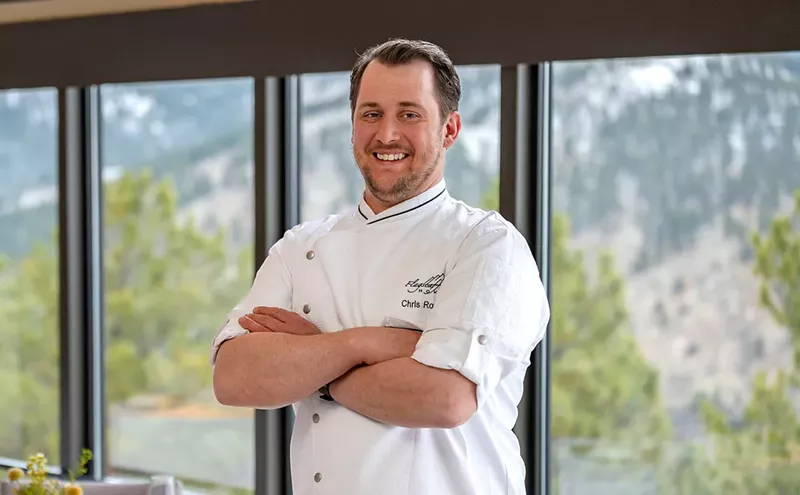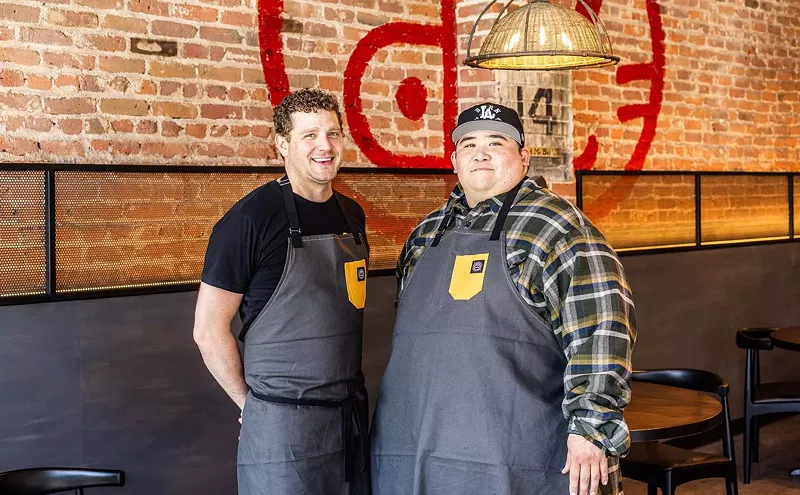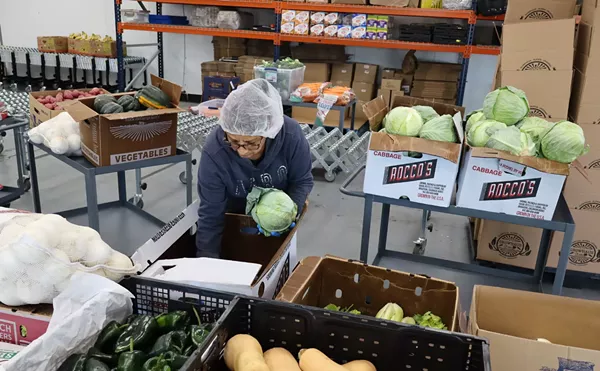I've eaten a lot of breakfasts and lunches and dinners out in that time. And I've had a lot of bad ones. I've been disappointed, nauseated, poisoned, thrown out, threatened and lied to. I've been served food that I wouldn't feed my cat. I've ruined dozens of pairs of pants hiding appetizers in the pockets that I could not be coerced into eating under any circumstances.
I've had worse individual plates set before me, and even been to worse restaurants than Islamorada. But as I look at the remains of the first half of my lunch -- the gray crabcakes, the sickly sweet and rubbery coconut shrimp with their spicy orange marmalade, the water-stretched chicken-and-corn chowder -- and wonder where it can go from here, I realize that this is already the worst meal I've had since a truly unfortunate dinner at a Pappadeaux in Albuquerque half a decade ago.
I make a quick check of the mental rolodex, flipping through my scattered recollections of the thousand or so restaurants I've eaten at since then, and the search comes back clean. Islamorada is it: the worst. Not by much, but by enough to make it decisive. And as I absorb this, a beatific smile spreads across my face; an aura of pure Buddha enlightenment suddenly surrounds my table. I am a creature of absolutes, after all, and it is with a light heart that I celebrate having hit bottom. Again.
Sitting here, I'm reminded of an English professor I had in college. He was a good one, the kind of guy who taught Chaucer in prison and tried to explain to gangbangers how couplets were more powerful than guns. He did standup on the side, regularly canceled classes if it was too warm, too cold, too much of a Tuesday, whatever. And, like me, the man loved his Shakespeare, and either in class or at one of Buffalo's many fine bars where we sometimes retired after class, he taught me an important thing about the enduring power of Wild Bill's work: that the reason Shakespeare's plays have lasted as long as they have -- the reason they are still read and performed today -- is because Shakespeare set the standard for our tragedies. He gave all us poor saps who came after him boundaries, extremes of human experience that could never be exceeded. His work stood as a sort of psycho-social money-back guarantee: No man alive would ever suffer more than Lear or Troilus or Hamlet, no fourteen-year-old would ever love (and die) as well as Romeo, no couple would ever bicker better than Beatrice and Benedick (though my wife and I certainly try).
Through Shakespeare, we learn limits and are given parameters by which to judge all future experiences. When people describe something as "Shakespearean," they mean it is unconditional: either the soaring apex of love or the bitter depths of calamity. They are speaking of an inarguable absolutism that delineates the margins of our experience. Beyond this line, thou shalt not cross.
Islamorada? This motherfucker is my Hamlet, this room my goddamn Birnam Wood.
Knowing that it cannot get any worse fortifies me, so when my main course arrives, I can hammer my fork through the scorched crust of sesame seeds on an otherwise ice-cold tuna steak; get past the crisscrossing Day-Glo stripes of pink and white squeeze-bottle sauces (the white a horseradishy mayo, the pink a weak, sour wasabi and pink, which is bad enough on its own) that make the fish look like some kind of insane wedding cake for chickadees; and even gum the flaccid mixed vegetables (wet lozenges of carrot, hunks of damp squash and broccoli florets that have been steamed to death but never shocked, leaving them limp and smelling of sulfurous ass) with an idiot's grin and a sense of utter peace. When my chunks of deep-fried alligator arrive, I can enjoy them for what they are, which is horrible. They taste nothing like alligator (which tastes powerfully gamey and reptilian, like taking a bite out of an iguana) and don't even taste like chicken (that old joke), but rather like Chicken McNuggets from McDonald's -- like an idea of chicken, a notion of poultry, but mostly just fryer oil and salt. They arrive with a green jalapeño dipping sauce so thick and gelatinized that it doesn't stick when I dunk my 'gator in it, so I have to spread it with a knife. The sauce tastes like jalapeño toothpaste and is the color of green hospital scrubs, an insipid shade meant to inspire calm in those who might otherwise go mad from bold colors.
Islamorada opened ten months ago in the best spot in the world for those genetically incapable of appreciating irony: inside the Bass Pro Shops Outdoor World megastore in the Northfield development at Stapleton. At Outdoor World, you can buy a boat. Or a fishing pole. Or a ridiculous hat. Or a shotgun. Basically, you can buy anything you need for killing any living thing on the planet, from bacteria to bull elephants, and shop for your heart's desire in an environment already filled with things that have been previously killed by other people. The massive front entrance is festooned with horns and antlers, like the hunting lodge of a giant in Nordic myth. And inside, everywhere you look, something dead and taxidermied is looking back at you. There are moose and bears and squirrels and possums and chipmunks and birds and more bears and deer and more moose. There are mountain lions leaping from rocky ledges and snakes among the stones. The dead critters have all been posed and set up in dioramas that approximate their natural habitat -- say, a two-story fake waterfall and fish tank rising beside a Starbucks -- and quotes about hunting and fishing and nature festoon the walls. My favorite: "In wilderness is the preservation of the world," by Thoreau, posted right on the wall near the elevator that takes you to the second floor, where they keep all the guns.
Islamorada is accessible from inside the store or through its own entrance. The restaurant is huge. The waiting area is huge. The gazebo-like main dining room is huge, with seating for several hundred under the soaring dome over the enormous central fireplace, with a copper chimney as tall as a cutter's mainmast and support pillars made of whole tree trunks. The bathrooms -- painted with palm trees and waving ferns, so I feel like I've just stepped away from my fishing camp for a moment to piss directly on nature -- are huge. And there are huge amounts of fish everywhere: paintings of fish and pictures of fish, and actual (dead) fish mounted, hanging from a false ceiling painted to look like waves seen from below, squirming from the walls, frozen in positions of rigor, leaping and struggling and straining for a surface that they'll never see. Enormous sharks and marlin and sword and tarpon depend from cables bolted to the rafters. A creepy brass sea monster with dead eyes and big teeth is bolted to the rail that separates the bar from the dining room. And behind the bar, a massive fish tank holds actual (live) fish -- which, I can only imagine, must be fucking horrified.
According to my research (reading the little blurb on the inside fold of the menu), Islamorada began back in the 1940s as a small snack bar and fish restaurant attached to a bait store on the pier in Key West. It was popular with the locals, the kind of place where you would go to eat conch fritters while the sun went down and watch the guides come in with their wells full of gaffed tarpon and bludgeoned permit.
Now Islamorada is a chain of seafood restaurants attached like lampreys to the fat flanks of Bass Pro shops in several states (with more on the way), restaurants that all claim to be "As Fresh As You Can Get" -- a conceit so unconscionably ludicrous that I refuse to even make fun of it. At the Islamorada in this landlocked city, you can get New England clam chowder with no hint of clam flavor and Maryland crabcakes made with lump blue crab turned gray by freezing. You can order skillets full of black mussels, which are walked proudly around the dining room, sizzling on their platters and trailing a fog of steam like the contrail of a jet plane loaded with shellfish and garlic going down hard. You can bite into Reubens made with grouper, grouper portofino (blackened and topped with shrimp), elk steaks and buffalo burgers and shrimp and grits done Southern style. And all of it is awful, presented like it was die-stamped from fish-flavored cardboard, cooked for a dumb-money demographic willing to drop a hundred bucks on a dinner for two that could be better prepared from the freezer case at King Soopers.
And yet, huge as it is and bland as it is and hokey as it is, Islamorada is also hugely busy. Look online and you will see people who plan their vacations around visits to various locations. Ask a server how business has been and she'll just laugh, gesture around at the full floor and say, "How do you think?"
On a Saturday afternoon, I have to wait for the privilege of having my worst meal -- a half-hour I spend browsing through the boats, poking at taxidermied beavers and waiting for my greasy blue Islamorada pager to go off. When I return for dinner on a Monday, I sneak a look at the hostess book and see that I'm getting one of the last three available tables. And when I call a few days later, I'm simply told not to come on a Thursday, Friday, Saturday or Sunday. They don't take reservations, the hostess tells me, and the wait can be an hour for a table on a Saturday night. Sometimes two.
Food aside, I'm impressed by the systems that underlie operations here, the way Islamorada can serve so many people, turn so many tables, and still keep the place from descending into utter chaos every night. In the kitchen, the menu is broken down to pictograms -- photographs of each ideal plate hung up over the line as a ready reference. There are expo lines at the pass, waitress stations set up every 25 feet or so around the periphery of the dining room so that no server ever has to wait to run a check. There are times when I count nearly twenty servers on the floor, plus floor managers who are really more like casino pit bosses, with headsets on and their eyes seeing everything. The hostess stand is double-staffed, the bar triple. And because it's so well thought out, the service is good. It's friendly. My waitresses remember my name (my assumed name, anyhow) and seem to really want me to have a good time.
It helps that on my second visit, I trade the warm root beer I'd had at that first lunch for something off the specialty drink menu called a "Pain Killer," which feels appropriate. Seven bucks brings me a weak rum-and-fruit-juice concoction sprinkled with nutmeg and garnished with fruit stuck on a tiny plastic sword. Twenty-one bucks kills most of my pain. I order all the top-end items, going for a pound of steamed shrimp not so much seasoned as buried in Old Bay, a New York strip done bloody-rare, a baked potato drooling butter and sour cream, and a lobster tail with drawn butter. The steak is choice, stringy, without the smoothness of a good marble to hold the flavor together. It tastes of grill char and water-thinned blood and salt, like the steaks I ate when I was a kid and didn't judge every bite against a thousand steaks gone before. Plain, the lobster tail -- frozen, thawed, cooked hard and served tough -- tastes like textured air, like breath. Drenched in butter, it tastes like butter -- which is the flavor most people think of when they think of lobster anyhow.
Sadly, it is not the worst meal I've ever had. It cannot top the tragedy of my lunch two days before. Which means it is just another meal, one soon to be consigned to that mental rolodex and deservedly forgotten.



